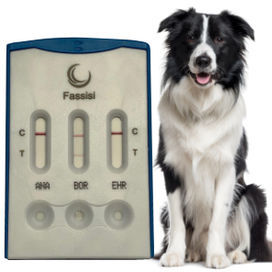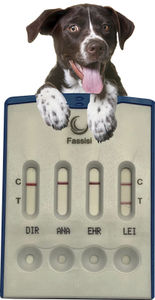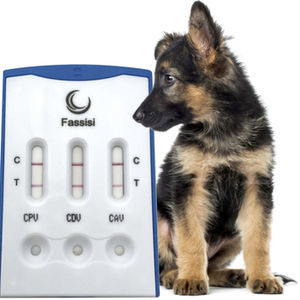
- Laboratory
- Laboratory medicine
- Rapid infectious disease test
- Fassisi, Gesellschaft für Veterinärdiagnostik und Umweltanalysen mbH

- Products
- Catalogs
- News & Trends
- Exhibitions
Rapid infectious disease test CANVECTO 3for dogsfor antibodiesbacteria
Add to favorites
Compare this product
Characteristics
- Applications
- for infectious diseases
- Patient type
- for dogs
- Tested parameter
- for antibodies
- Micro-organism
- bacteria, Borrelia burgdorferi, Ehrlichia, Anaplasma phagocytophilum, Anaplasma platys
- Sample type
- serum, plasma, clinical
- Specificity
95 %, 96.7 %, 100 %
- Sensitivity
92.5 %, 95.7 %, 97.7 %
Description
The rapid test to detect Anaplasma phagocytophilum antibodies, Borrelia burgdorferi antibodies and Erlichia canis antibodies in dogs.
Easy on-site usage, with results available within a few minutes
For serum, plasma and whole blood
All items required are included in the testkit
Storage at 2-30 degrees
Further information
Anaplasma, Borrelia burgdorferi and Ehrlichia are vector-transmitted (ticks), intracellular bacteria and play a role in dogs.
Anaplasmosis: In Europe Anaplasma phagocytophilum and Anaplasma platys are found in domestic dogs. The antibodies are detected using A. phagocytophilum antigens or A. platys antigens.
Lyme borreliosis: Worldwide at least 13 genospecies belong to the Borrelia burgdorferi sensu lato (Bsl) complex. In dogs, the pathogenicity for B. burgdorferi sensu stricto has been proven. The antibodies are detected with a specific antigen mixture of surface proteins of Borrelia burgdorferi.
Ehrlichiosis: Dogs infected with Ehrlichiosis develop canine monocytic ehrlichiosis. The occurrence of infections is related to the spread of the vector R. sanguineus. The antibodies are detected using E. canis antigens.
Serology: Serological results must always be interpreted in conjunction with clinical findings. Negative test result: they do not rule out infection, as seronegative results may occur at any stage of infection. Positive test result: In the endemic area positive antibody results may be due to a previous infection.
Other Fassisi, Gesellschaft für Veterinärdiagnostik und Umweltanalysen mbH products
PRODUCTS FOR SMALL ANIMALS
Related Searches
- Assay kit
- Blood assay kit
- Serum assay kit
- Plasma assay kit
- Blood rapid diagnostic test
- Rapid lateral flow test
- Immunoassay rapid diagnostic test
- Cassette rapid diagnostic test
- Whole blood detection kit
- Rapid virus test
- Serum rapid diagnostic test
- Plasma rapid diagnostic test
- Infectious disease rapid diagnostic test
- Whole blood rapid diagnostic test
- Urine rapid diagnostic test
- Laboratory detection kit
- Bacteria rapid diagnostic test
- Strip rapid diagnostic test
- Animal assay kit
- Rapid feces test
*Prices are pre-tax. They exclude delivery charges and customs duties and do not include additional charges for installation or activation options. Prices are indicative only and may vary by country, with changes to the cost of raw materials and exchange rates.

















